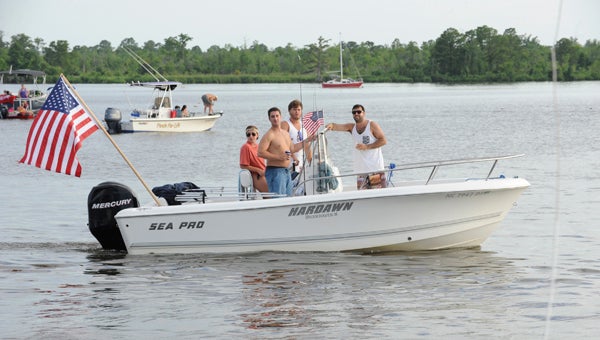Ocean or river, make boating safety a priority
Published 7:07 pm Wednesday, October 7, 2015

DAVID CUCCHIARA | DAILY NEWS
BETTER SAFE THAN SORRY: A boat floats along the Pamlico River during Fourth of July celebrations this summer.
On Wednesday, the search for a local Beaufort County crabber came to an end, though the efforts from local rescue teams — the Coast Guard, the Beaufort County Sheriff’s Office, the Bunyan Volunteer Fire Department, the Bath Volunteer Fire Department, the Sidney Volunteer Fire Department and other volunteers — were certainly commendable.
Although the cause of death has yet to be determined, Michael Hopkins, 52, was an avid fisherman familiar with the waters of the Pamlico River.
Typically, for an experienced fisherman, an afternoon on the river provides a calm, safe escape from the rush of every day life, while also serving as an economic engine for local businesses. Its sunsets are majestic and waters picturesque, but in all of its beauty, there are dangers as well.
The ocean is, undoubtedly, the most treacherous body of water in the world — irregular seas and dangerous marine life with no guarantee of land within sight. Every year, ships capsize, swimmers drift too far off and hurricanes unleash powerful tidal waters on to shore.
A river or sound may not carry the same reputation as an ocean, but safety is vital, no matter the conditions. And unlike the ocean, with the exception of an oil spill, a river brings different dangers like pollution or algal blooms, similar to the ones that occurred on the Chowan River in September.
Proactivity is vital when hitting the open water. In 2009, a law was passed requiring all boasters operating a vessel with a motor of 10 horsepower or great on public waters to take a boating safety class. This, however, does not cover all vessels, so it’s always smart to be prepared regardless.
North Carolina requires those under the age of 13 to wear a life vest. But for those who aren’t required by law, it’s a good idea to wear one anyway. Sometimes, there isn’t enough time allotted to reach for a life vest or flotation device in a time of emergency. Also, on top of making sure vests are on board, it’s important to check the vest’s condition.
North Carolina also requires other safety protocols and devices like an emergency kill switch lanyard and a backfire flame arrestor, required on inboards and stern drives only.
Vigilance and preparation can saves lives, even if it’s a simple and relaxing afternoon fishing on the typically calm waters of Blounts Creek. Check the North Carolina Resources Commission’s website for more information on boating safety.




